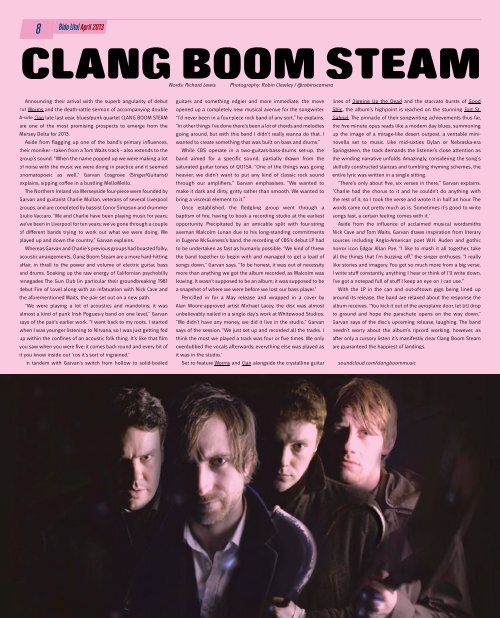Issue 32 / April 2013
April 2013 issue of Bido Lito! Featuring MIND MOUNTAIN, CLANG BOOM STEAM, LUDOVICO EINAUDI, WE CAME OUT LIKE TIGERS, JON MORTER and much more.
April 2013 issue of Bido Lito! Featuring MIND MOUNTAIN, CLANG BOOM STEAM, LUDOVICO EINAUDI, WE CAME OUT LIKE TIGERS, JON MORTER and much more.
Create successful ePaper yourself
Turn your PDF publications into a flip-book with our unique Google optimized e-Paper software.
8<br />
Bido Lito! <strong>April</strong> <strong>2013</strong><br />
Clang Boom Steam<br />
Words: Richard Lewis<br />
Words: Richard Lewis<br />
Photography: Robin Clewley / @robinscamera<br />
Announcing their arrival with the superb angularity of debut<br />
cut Worms and the death-rattle sermon of accompanying double<br />
A-side Clan late last year, blues/punk quartet CLANG BOOM STEAM<br />
are one of the most promising prospects to emerge from the<br />
Mersey Delta for <strong>2013</strong>.<br />
Aside from flagging up one of the band’s primary influences,<br />
their moniker - taken from a Tom Waits track – also extends to the<br />
group’s sound. “When the name popped up we were making a lot<br />
of noise with the music we were doing in practice and it seemed<br />
onomatopoeic as well,” Garvan Cosgrove (Singer/Guitarist)<br />
explains, sipping coffee in a bustling MelloMello.<br />
The Northern Ireland via Merseyside four-piece were founded by<br />
Garvan and guitarist Charlie Mullan, veterans of several Liverpool<br />
groups, and are completed by bassist Conor Simpson and drummer<br />
Giulio Vaccaro. “Me and Charlie have been playing music for years;<br />
we’ve been in Liverpool for ten years; we’ve gone through a couple<br />
of different bands trying to work out what we were doing. We<br />
played up and down the country,” Garvan explains.<br />
Whereas Garvan and Charlie’s previous groups had boasted folky,<br />
acoustic arrangements, Clang Boom Steam are a more hard-hitting<br />
affair, in thrall to the power and volume of electric guitar, bass<br />
and drums. Soaking up the raw energy of Californian psychobilly<br />
renegades The Gun Club (in particular their groundbreaking 1981<br />
debut Fire of Love) along with an infatuation with Nick Cave and<br />
the aforementioned Waits, the pair set out on a new path.<br />
“We were playing a lot of acoustics and mandolins; it was<br />
almost a kind of punk Irish Pogues-y band on one level,” Garvan<br />
says of the pair’s earlier work. “I went back to my roots. I started<br />
when I was younger listening to Nirvana, so I was just getting fed<br />
up within the confines of an acoustic folk thing. It’s like that film<br />
you saw when you were five: it comes back round and every bit of<br />
it you know inside out ‘cos it’s sort of ingrained.”<br />
In tandem with Garvan’s switch from hollow to solid-bodied<br />
guitars and something edgier and more immediate, the move<br />
opened up a completely new musical avenue for the songwriter.<br />
“I’d never been in a four-piece rock band of any sort,” he explains.<br />
“In other things I’ve done there’s been a lot of chords and melodies<br />
going around, but with this band I didn’t really wanna do that. I<br />
wanted to create something that was built on bass and drums.”<br />
While CBS operate in a two-guitars-bass-drums set-up, the<br />
band aimed for a specific sound, partially drawn from the<br />
saturated guitar tones of QOTSA. “One of the things was going<br />
heavier; we didn’t want to put any kind of classic rock sound<br />
through our amplifiers,” Garvan emphasises. “We wanted to<br />
make it dark and dirty, gritty rather than smooth. We wanted to<br />
bring a visceral element to it.”<br />
Once established, the fledgling group went through a<br />
baptism of fire, having to book a recording studio at the earliest<br />
opportunity. Precipitated by an amicable split with four-string<br />
axeman Malcolm Lunan due to his long-standing commitments<br />
in Eugene McGuiness’s band, the recording of CBS’s debut LP had<br />
to be undertaken as fast as humanly possible. “We kind of threw<br />
the band together to begin with and managed to get a load of<br />
songs down,” Garvan says. “To be honest, it was out of necessity<br />
more than anything we got the album recorded, as Malcolm was<br />
leaving. It wasn’t supposed to be an album; it was supposed to be<br />
a snapshot of where we were before we lost our bass player.”<br />
Pencilled in for a May release and wrapped in a cover by<br />
Alan Moore-approved artist Michael Lacey, the disc was almost<br />
unbelievably nailed in a single day’s work at Whitewood Studios.<br />
“We didn’t have any money, we did it live in the studio,” Garvan<br />
says of the session. “We just set up and recorded all the tracks. I<br />
think the most we played a track was four or five times. We only<br />
overdubbed the vocals afterwards; everything else was played as<br />
it was in the studio.”<br />
Set to feature Worms and Clan alongside the crystalline guitar<br />
lines of Digging Up the Dead and the staccato bursts of Good<br />
Ship, the album’s highpoint is reached on the stunning Fort St.<br />
Gabriel. The pinnacle of their songwriting achievements thus far,<br />
the five-minute opus reads like a modern day blues, summoning<br />
up the image of a mirage-like desert outpost, a veritable mininovella<br />
set to music. Like mid-sixties Dylan or Nebraska-era<br />
Springsteen, the track demands the listener’s close attention as<br />
the winding narrative unfolds. Amazingly, considering the song’s<br />
skilfully constructed stanzas and tumbling rhyming schemes, the<br />
entire lyric was written in a single sitting.<br />
“There’s only about five, six verses in there,” Garvan explains.<br />
“Charlie had the chorus to it and he couldn’t do anything with<br />
the rest of it, so I took the verse and wrote it in half an hour. The<br />
words came out pretty much as is. Sometimes it’s good to write<br />
songs fast, a certain feeling comes with it.”<br />
Aside from the influence of acclaimed musical wordsmiths<br />
Nick Cave and Tom Waits, Garvan draws inspiration from literary<br />
sources including Anglo-American poet W.H. Auden and gothic<br />
horror icon Edgar Allan Poe. “I like to mash it all together, take<br />
all the things that I’m buzzing off,” the singer enthuses. “I really<br />
like stories and imagery. You get so much more from a big verse.<br />
I write stuff constantly, anything I hear or think of I’ll write down.<br />
I’ve got a notepad full of stuff I keep an eye on I can use.”<br />
With the LP in the can and out-of-town gigs being lined up<br />
around its release, the band are relaxed about the response the<br />
album receives. “You kick it out of the aeroplane door, let [it] drop<br />
to ground and hope the parachute opens on the way down,”<br />
Garvan says of the disc’s upcoming release, laughing. The band<br />
needn’t worry about the album’s ripcord working, however, as<br />
after only a cursory listen it’s manifestly clear Clang Boom Steam<br />
are guaranteed the happiest of landings.<br />
soundcloud.com/clangboommusic


















